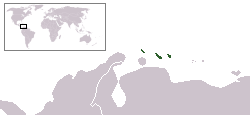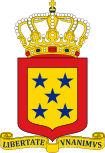
The Netherlands Antilles was a constituent country of the Kingdom of the Netherlands. The country consisted of several island territories located in the Caribbean Sea. The islands were also informally known as the Dutch Antilles. The country came into being in 1954 as the autonomous successor of the Dutch colony of Curaçao and Dependencies. The Antilles were dissolved in 2010. The Dutch colony of Surinam, although it was relatively close by on the continent of South America, did not become part of the Netherlands Antilles but became a separate autonomous country in 1954. All the island territories that belonged to the Netherlands Antilles remain part of the kingdom today, although the legal status of each differs. As a group they are still commonly called the Dutch Caribbean, regardless of their legal status. People from this former territory continue to be called Antilleans in the Netherlands.

The ABC islands is the physical group of Aruba, Bonaire, and Curaçao, the three westernmost islands of the Leeward Antilles in the Caribbean Sea. These have a shared political history and a status of Dutch underlying ownership, since the Anglo-Dutch Treaty of 1814 ceded them back to the Netherlands, as Curaçao and Dependencies from 1815. They are a short distance north of the Falcón State, Venezuela. Aruba and Curaçao are autonomous, self governing constituent countries of the Kingdom of the Netherlands, while Bonaire is a special municipality of the Netherlands. Territories of the Kingdom of the Netherlands, the countries, and its special municipalities, are outside the European Union; citizens have Dutch nationality and the former colonial power benefits from preferential trade, mineral and natural resource rights, particularly offshore.

Gilberto François "Betico" Croes was an Aruban political activist who was a proponent for Aruba's separation from the Netherlands Antilles. This eventually occurred in 1986, but following a car accident on 31 December 1985, Croes lapsed into a coma and never became conscious to see his accomplishment. He is best remembered as "Libertador" (liberator) and as father of the Aruban people.

The SSS islands, locally also known as the Windward Islands, is a collective term for the three territories of the Dutch Caribbean that are located within the Leeward Islands group of the Lesser Antilles. In order of population size, they are: Sint Maarten, Sint Eustatius and Saba. In some contexts, the term is also used to refer to the entire island of Saint Martin, alongside Sint Eustatius and Saba.

The Netherlands Antilles national football team was the national team of the former Netherlands Antilles from 1958 to 2010. It was controlled by the Nederlands Antilliaanse Voetbal Unie. The NAVU consisted of Curaçao and Bonaire. Aruba split in 1986 and has its own team.
Same-sex marriages are not performed in Aruba, Curaçao, or Sint Maarten, which are constituent countries of the Kingdom of the Netherlands. The islands were obliged after several court rulings to register any marriage registered in the Kingdom, but this primarily considers residency rights and they do not have to give same-sex marriages the same legal effect as opposite-sex marriages. Marriage in the European territory of the Netherlands, as well as in the Caribbean municipalities of Bonaire, Sint Eustatius and Saba, is open to any two people irrespective of sex.

The Netherlands Antillean guilder is the currency of Curaçao and Sint Maarten, which until 2010 formed the Netherlands Antilles along with Bonaire, Saba, and Sint Eustatius. It is subdivided into 100 cents. On 1 January 2011, in the islands of Bonaire, Saba and Sint Eustatius, the guilder was replaced by the United States dollar. In Curaçao and Sint Maarten, the Netherlands Antillean guilder was proposed to be replaced by a new currency, the Caribbean guilder, but this was stalled indefinitely by negotiations over the establishment of a separate central bank for Curaçao. In November 2020, the Central Bank announced the introduction of the replacement guilder, which was planned to be implemented in the first half of 2021; however, implementation was delayed several times.

Scouting Antiano is the national Scouting organization of the former Netherlands Antilles. It serves 1,600 members in 25 Scout groups, 21 Scout groups on Curaçao, two on Sint Maarten, two on Bonaire, none on Saba and Sint Eustatius. Since 2016, Scouting Antiano is a full member World Organization of the Scout Movement. Until then, it was an associate member of the Interamerican Region of the World Organization of the Scout Movement.
The Scout and Guide movement in the Dutch Caribbean is served by

The Charter for the Kingdom of the Netherlands is a legal instrument that sets out the political relationship between the four countries that constitute the Kingdom of the Netherlands: Aruba, Curaçao, and Sint Maarten in the Caribbean and the Netherlands in Europe. It is the leading legal document of the Kingdom. The Constitution of the Netherlands and the Basic Laws of the three other countries are legally subordinate to the Charter.

The Netherlands Antilles was an autonomous Caribbean country within the Kingdom of the Netherlands. It was dissolved on 10 October 2010.

The following outline is provided as an overview of and topical guide to the Netherlands Antilles:
The Joint Court of Justice of Aruba, Curaçao, Sint Maarten, and of Bonaire, Sint Eustatius and Saba serves the three Caribbean countries of the Kingdom of the Netherlands and the three Caribbean special municipalities of the Netherlands. The court primarily hears disputes in first instance and on appeal of these six islands, and is on the same level as similar courts in the Netherlands. Since 2012, the court has also been authorized to hear inquiry procedures originated on Curaçao, of a type that would be heard in the Netherlands by the Enterprise Chamber in Amsterdam.

The Kingdom of the Netherlands, commonly known as simply the Netherlands, is a sovereign state and constitutional monarchy with 98% of its territory and population in Western Europe and with several small West Indian island territories in the Caribbean.

The following is an alphabetical list of topics related to the former nation of the Netherlands Antilles.

The Caribbean Netherlands are the three public bodies of the Netherlands that are located in the Caribbean Sea. They consist of the islands of Bonaire, Sint Eustatius and Saba, although the term "Caribbean Netherlands" is sometimes used to refer to all of the islands in the Dutch Caribbean. In legislation, the three islands are also known as Bonaire, Sint Eustatius and Saba or the BES islands. The islands are currently classified as public bodies in the Netherlands and as overseas countries and territories of the European Union; thus, EU law does not automatically apply.

A common visa exists since the end of 2010 for the territories of Aruba, Curaçao, Sint Maarten and the Caribbean Netherlands which form together the territory of the Kingdom of the Netherlands in the Caribbean. The visa is not valid for the European part of the Netherlands, which is part of the Schengen Area.

The Dutch Caribbean are the territories, colonies, and countries, former and current, of the Dutch Empire and the Kingdom of the Netherlands in the Caribbean Sea. They are in the north and south-west of the Lesser Antilles archipelago.
An island council was the governing body of an island territory, an administrative level of the Netherlands Antilles until its dissolution.
Same-sex marriage in Bonaire, Sint Eustatius and Saba has been legal since 10 October 2012, the effective date of legislation passed by the States General of the Netherlands enabling same-sex couples to marry.











